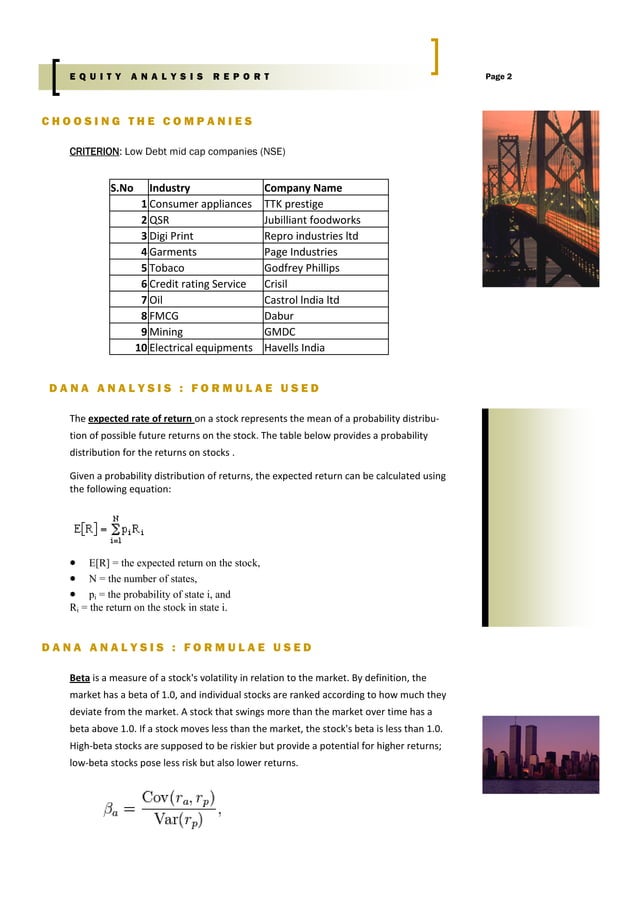Within the contemporary ever-changing economic landscape, traders are always seeking approaches to enhance their returns and managing uncertainties. One of the most productive strategies to realize this is via equity analysis, which offers a thorough knowledge of the equity market and individual companies. Through utilizing the expertise of equity analysis specialists, traders can acquire crucial understandings that yield better educated decisions and, finally, improved results.
Equity analysis consists of analyzing a company's fiscal condition, market share, and growth potential. This approach can uncover latent gems that could potentially go ignored. By engaging with equity analysis experts, investors can analyze intricate data, utilize sophisticated tools, and understand market movements, ensuring they stay ahead of the changes in an ever more competitive landscape. Taking on this analytical approach not solely empowers participants to increase their profits but also fosters a more substantial assurance in their decisions.
Understanding Equity Evaluation
Stock evaluation is a essential procedure that entails assessing a business's economic results and future capabilities to create knowledgeable financial decisions. By examining multiple economic metrics and industry trends, equity evaluators can identify the real worth of a share, helping shareholders comprehend whether it is overvalued or underpriced. This evaluation is essential for individuals seeking to gain an edge in the challenging world of investing, as it enables strategic choices based on data rather than guesswork.
At its foundation, stock evaluation can be broken down into two primary methods: fundamental analysis and chart analysis. Fundamental analysis focuses on examining the core financial health of a company, including its earnings, revenue, and overall economic reports. On the flip side, technical analysis looks at industry patterns and value movements to predict future behavior. Together, these methods provide a comprehensive view of a company's standing in the industry and its potential for growth.
Working with equity analysis professionals can substantially boost an investor's capacity to formulate smart choices. These experts possess the expertise and experience to analyze intricate information and spot investment opportunities that may not be visible to the average shareholder. Their insights can lead to better financial strategies, ultimately boosting profits and minimizing risks in a portfolio. By utilizing the expertise of stock evaluation experts, shareholders can navigate the stock market with greater confidence.

Key Metrics for Assessing Investments
When evaluating potential investments through equity analysis, various key metrics emerge as crucial tools for investors. P/E ratio, or P/E ratio, is one such metric which helps investors determine the relative value of a company’s shares. A elevated P/E ratio might suggest to a stock is overvalued or that investors are expecting high growth rates in the future. On the other hand, a diminished P/E ratio might indicate to a stock is undervalued and that the company is experiencing difficulties. Understanding this ratio can assist investors in deciding knowledgeable decisions about when to buy or sell stocks.
A further key metric is the Return on Equity, also known as ROE, that measures a company's profitability in relation to shareholders' equity. This figure provides insights into how effectively a company utilizes equity to generate profits. A consistently high ROE can indicate that the company remains efficient at converting investment into net income, which draws in more investors. On the flip side, a reducing ROE may prompt a review of the company’s operational effectiveness. Investors ought to consider ROE alongside additional metrics to gain a holistic view of a company's financial health.
Finally, the Debt to Equity ratio is crucial for evaluating the financial leverage of a company. This ratio shows the proportion of debt financing relative to equity, providing clues into risk factors. A high Debt to Equity ratio may indicate potential financial instability, especially in volatile economic conditions, while a diminished ratio suggests a more conservative approach to financing. Investors using equity analysis must keep these metrics in mind, as they highlight various aspects of a company’s performance and risk profile, ultimately aiding in making intelligent investment decisions.
Effective Advice for Profitable Equity Analysis
To execute effective stock evaluation, it's important to start with a solid grasp of the company's core values. Focus on key financial documents such as the income statement, financial position statement, and cash flow statement. Examine revenue increase, profit margins, debt levels, and cash flow trends to assess the company's financial well-being. By recognizing strengths and weaknesses in these areas, you can form a more knowledgeable opinion about the company's future outlook.
Subsequently, include market and industry evaluation into your equity evaluation process. Evaluate the competitive landscape, including market trends, regulatory changes, and economic factors that may impact the company. Understanding the broader context in which the company operates will assist you spot potential risks and opportunities. Additionally, comparing the company's results against its peers can provide valuable insights into its relative position in the market.
Finally, leverage the expertise of equity analysis specialists to enhance your investment strategy. These experts can provide deeper insights and nuanced interpretations of data that may not be readily apparent. Working together with equity research report who have extensive expertise and knowledge in specific industries can lead to more accurate valuations and better investment decisions. Utilize their reports, recommendations, and research to enhance your analysis and increase your chances of achieving strong returns.
